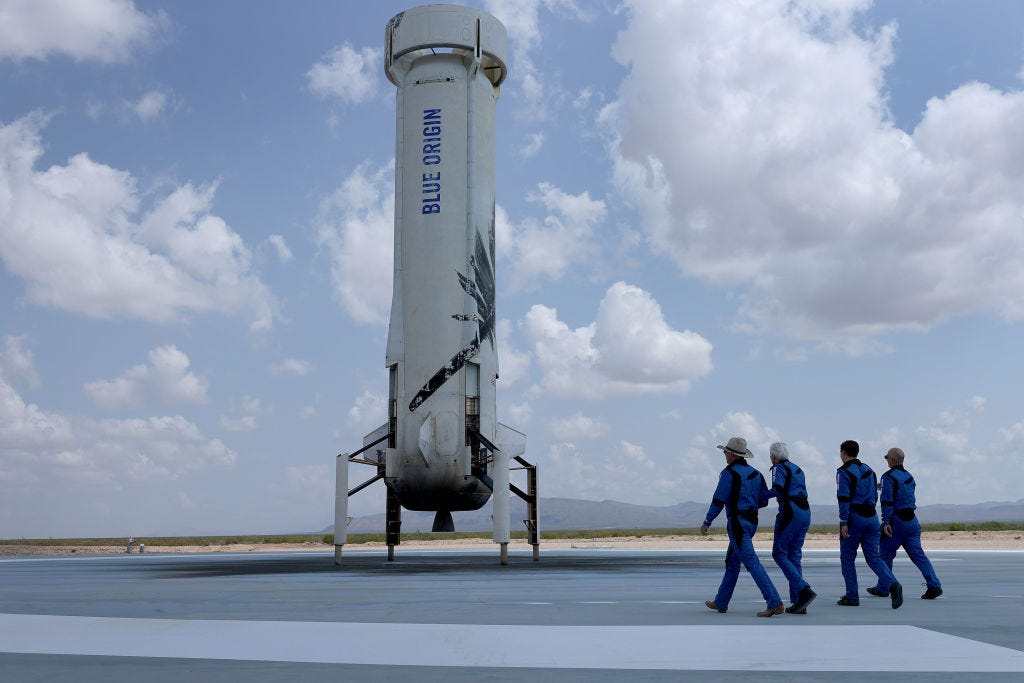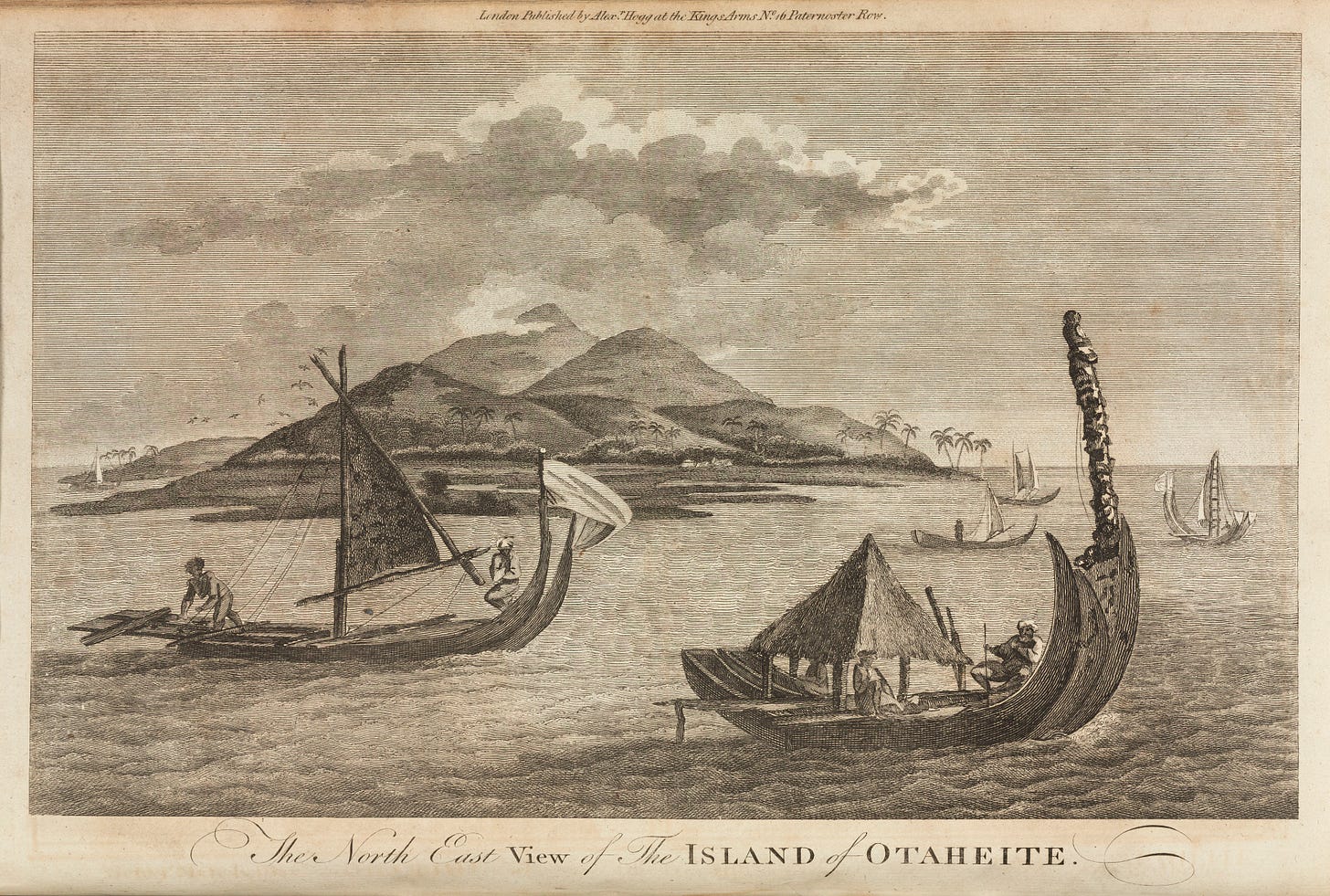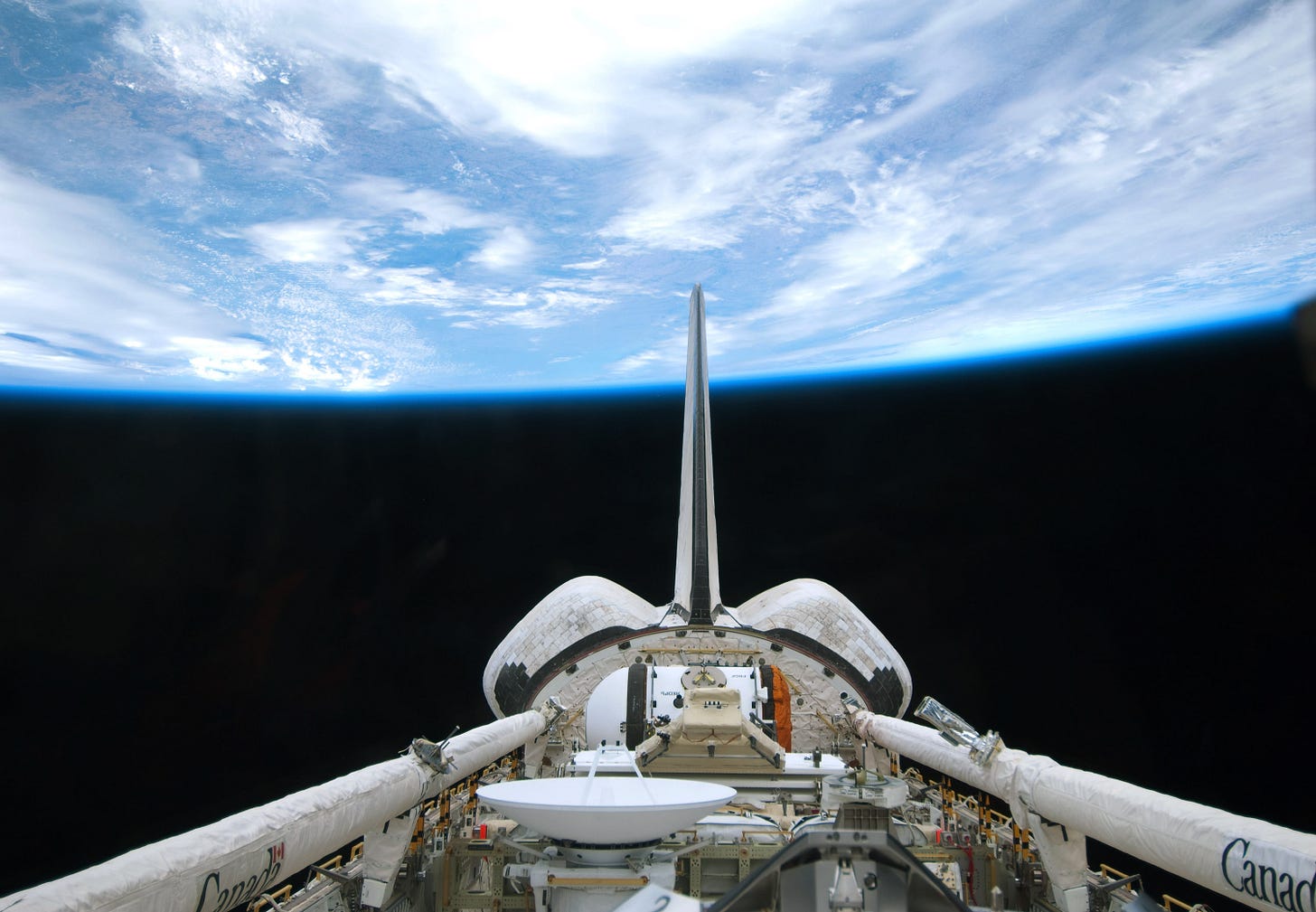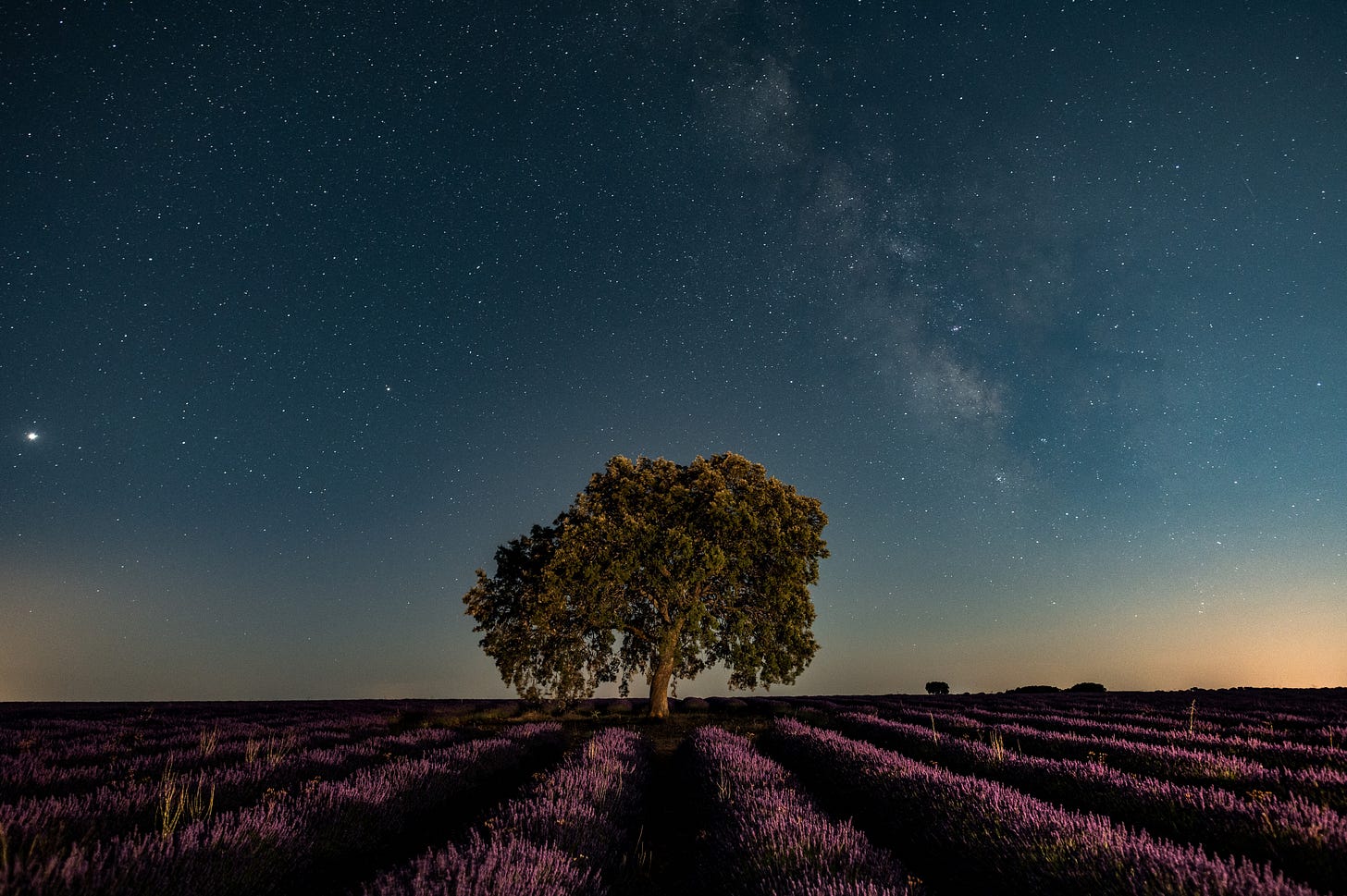Back on Earth
This past week, amid all the other news, we saw another billionaire escape the pull of Earth’s gravity. The images of Jeff Bezos floating in his rocket ship with the curvature of Earth outside the window is a moment I wish to explore for its many significances. What does it mean for our moment in history? What does it mean for the future? What does it mean for all that is happening back on Earth?
Let me start by admitting that I have a weakness for space.
It dates back to some of my earliest memories at my old Grandma Page’s house where I would look up in wonder at the Texas summer night sky and see a treasure chest of twinkling possibilities. She encouraged this pursuit in her young grandson, to take in the immensity of the cosmos. But there was never the expectation that anyone would travel into the great beyond — at least certainly not in my lifetime. That was left for the musings of fiction writers like Jules Verne.
Our expectations would be recast with a rapidity and audacity that still, after all this time, seems unimaginable. Just 20 years later I was a young man looking up at a new twinkling light, as the Soviet-launched Sputnik passed overhead. And then five years after that, chance landed me, a young reporter in Houston, at Rice Stadium on a muggy September day in 1962 to cover President John F. Kennedy’s call to go to the moon. I followed the Mercury, Gemini, and Apollo missions with avid interest. I cheered the triumphs and mourned the tragedies. While anchor of the CBS Evening News, I had to report on two Space Shuttle disasters — Challenger and Columbia.
I believe in the allure of crossing horizons. I recognize the urge to do so is ingrained deeply in the instincts that drive us. Cultures around the world and across millennia have wondered what lies over the horizon, the mountain, the ocean. We have used our courage and ingenuity to build crafts and master navigation. We have set out to go where no one has gone before.
I recognize that space travel is for many the ultimate dream. For a long time I held a faint and almost certainly misguided hope of becoming the first journalist in space. If I had billions of dollars at my disposal perhaps I would have been tempted to plot my own path to the stars. I do not begrudge those yearnings in others. And I also understand that there is a place for privately-funded exploration and innovation. Bezos, Richard Branson, who beat Bezos into space, and Elon Musk, whose SpaceX has accomplished by far the most of the three billionaire-led ventures, all are pitching their products as adding to the capacity for humans to explore space. I have no doubt that it is the destiny of our species to leave the confines of our home planet. And the energy and industry created by spaceflight does lead to other innovations useful on Earth, as well as gainful employment for scientists, engineers, and many others.
Yet having listed all those caveats, I must confess that the recent forays into space left me feeling more ambivalent than awe-struck. And I know I am not alone, if the response to some of my tweets are any indication.
For one, let’s consider the wealth that is making these explorations possible. We are at a time when income inequality is at levels that are not only inconceivable but destructive. And we’re not talking about simply the divide between the rich and the poor, but the wealth accumulated by the ultra-ultra-ultra (can I keep going?) rich. These are people whose personal resources rival that of independent nations. It is a wealth that is growing at a phenomenal pace. And it is wealth that is not being taxed nearly enough, when one considers all the loopholes for those who reside in this economic stratosphere.
Now you may ask, isn't it good that private funds are paying for advances that were once funded by taxpayers. But as many noted in the comments section to my tweet, and what I hoped to convey, is that taxpayers ARE paying for a lot of this in the taxes this nation is NOT getting from these people. And we are also paying for it in all the investment we have already made as a nation in science and technology and space exploration, upon which these recent efforts are based. But it goes deeper than that.
There also is the timing of these ventures and the fraught symbolism it raises. We may dream of going into space, or even at one point colonizing Mars, but we can’t afford to leave Earth behind. After his jaunt into space, Bezos had no choice but to return to our planet, the only place we currently know of in the universe that will sustain life.
And what of our fragile home? It is hurting in so many different ways, all in need of urgent attention and resolve. There is political turmoil, and the spread of lies, and racism, xenophobia, and the other tears to our social fabric. There is hunger and disease, so much disease at the present. And then there is the climate crisis, which exacerbates all the rest of the stresses pulling at the natural world and our human societies. We are seeing wildfires, floods, heatwaves and rising seas at scales that make the deadly threat we face all too apparent and immediate. We have billions of people living on the planet, not to mention all the other species with whom we share our home. None of us are heading into space. Our fate is intertwined here on Earth.
For sure we need to explore and cross new horizons, but the most urgent of those are at home, especially at such a dangerous inflection point in history. These horizons are in how we build a more just society and in how we lessen human suffering. They are in how we create clean power, grow food, and build resilience. We need to empower science to tackle Earth’s challenges. We need moonshots to save our coral reefs and our forests, to probe the world of microbes and mass migrations, to save all that is precious and precarious.
Now there will always be tradeoffs in how we allocate resources, as nations and as individuals. And space exploration is a worthy goal. But what I think rubbed many the wrong way was the tone as much as the substance of these billionaire flyboys. There was a sense shared by many that these men act like they are operating in a world distinct from the one the rest of us have no choice but to share, that these flauntings of wealth, alongside all the other flauntings of wealth and privilege we see from the super-rich, exacerbate a notion of division as opposed to unity.
There is a certain irony that this comes in the form of space travel, because when you look back at our Earth from outer space, you can’t help but be moved by the reality that we are all living together on what the astronomer Carl Sagan so famously termed the “pale blue dot.” Sagan of course believed in exploring the heavens, but he also summoned forth with eloquent insight the stakes for us here at home.
Here is a video of his famous passage with a partial excerpt below.
“Our posturings, our imagined self-importance, the delusion that we have some privileged position in the Universe, are challenged by this point of pale light. Our planet is a lonely speck in the great enveloping cosmic dark. In our obscurity, in all this vastness, there is no hint that help will come from elsewhere to save us from ourselves.
The Earth is the only world known so far to harbor life. There is nowhere else, at least in the near future, to which our species could migrate. Visit, yes. Settle, not yet. Like it or not, for the moment the Earth is where we make our stand.
It has been said that astronomy is a humbling and character-building experience. There is perhaps no better demonstration of the folly of human conceits than this distant image of our tiny world. To me, it underscores our responsibility to deal more kindly with one another, and to preserve and cherish the pale blue dot, the only home we've ever known.”
How prophetic Sagan’s words read now, as we face challenges he couldn’t have anticipated. The pandemic and the effects of climate change only reinforce the truth that threats to our existence can come in many forms. Some people may try to build walls of wealth and privilege. They may be protected for a while, even if it is at the expense of so many. But ultimately all of our descendants will have to live on the planet we have created.
What gives me hope is that the destructive powers humans exhibit are more than matched by the creativity, insightfulness, and sheer will that are also products of the human mind. And to be fair, spaceflight is an example of our ingenuity. Right now we may face many challenges that seem insurmountable, but we do not know what innovations will come with new knowledge and perseverance.
We need to value the explorations of learning that come with our walks through life. Space exploration is certainly part of this equation. But we cannot lose perspective. We cannot lose sight of our duty to our fellow human beings and the balance we must achieve to preserve our precious Earth. If we head into space without cherishing and protecting our home, we are not explorers as much as deserters.
Post Script:
I shared another tweet about the Bezos space foray this week.
Please excuse the snark about how Bezos’s business success has been at the expense of many local bookstores, but I wanted to create a lens through which to consider the launches into space. There are so many things to love about bookstores, but the central idea is that these are places in which we can seek new knowledge. In books we can feel the pull of empathy, open our minds to new thoughts, reflect on what binds us together and drives us apart. Just as bookstores have shelves dedicated to different types of books, we need to all cherish the vast array of human pursuits.
I hope to continue to build a community here on Steady. If you aren’t already a subscriber, please consider signing up to a free or paid subscription. You can also leave a one-time tip to support our work. And if you are already part of our family, please consider sharing this post — and Steady — with others.








Thank you for this article. Beautifully written and absolutely necessary.
Five years ago I began filling binders with articles that represented the destruction of our government and societal norms - to note history in case we continued into 1984 territory. I had to develop a discerning eye for what should be saved or my house would have been taken over if I had printed every article that prompted anger, sadness, grief, disgust & outrage.
About two years ago I began a different set of binders for articles on how some were fighting & occasionally winning against all the awful. In the last six months more than a few of Steady’s articles have joined this collection. Today’s is a definite addition. Thank you.
I cannot disagree with these sentiments. Those with great wealth have the ability to isolate themselves from the daily trials and tribulations that the average person experiences. And that social divide is reflected all around us, whether the subject is the climate crisis, the impact of the pandemic, homelessness and fair housing issues, hunger, etc.
The news is there for anyone to read, for sure. But reading about the rising price of beef is rather different from the experience of actually walking into a store and suffering sticker shock. Especially when it is accompanied with the knowledge that what you have in your pocket will not allow you to purchase everything you need.
The billionaires of the world, and increasingly those who are suppose to represent us in government are far removed from what the majority of Americans experience on a daily basis. Journalism and reporting can only go so far in enlightening those who by choice or necessity hold themselves apart from the general public.
Bezo's flight to space was made on the backs of everyone who had no choice to rely on Amazon during the pandemic and beyond. Space travel is a wonder, and every person who has spoken or written about the experience of viewing the earth from the space station or other vessel has expressed how it changed their perspective. (Some of the astronaut accounts are truly extraordinary when it comes to personal revelations.)
In my opinion, the only way forward that offers any real promise of hope is one that involves common purpose and unites us. The prevalent ideology of "I got mine, you get yours" does not work for the whole of society and is a path paved with failure and loss.
As always I am deeply appreciative of the work and the thoughtfulness that Dan Rather and the Steady team brings. Thank you.